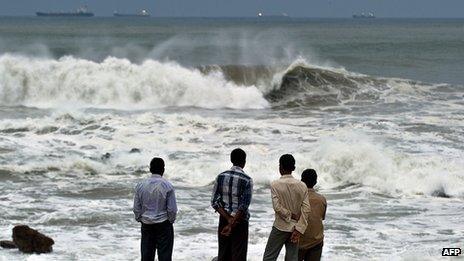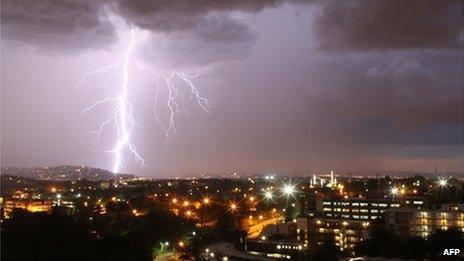Stormy times for emerging markets
- Published

It all goes back to the financial crisis. The waves now crashing on the shores of emerging economies such as Turkey and India are the result of the extraordinary policies pursued by central banks in the wake of the crisis and the process of returning to normal that is now underway, at least in the United States.
Central banks in the rich world really pulled the stops out in an effort to prevent the financial crisis turning into a really severe downturn.
Official interest rates were cut to almost zero. Still they thought it wasn't enough. Having hit what's called the zero bound for interest rates, some central banks wanted to do more.
So we have quantitative easing, QE, which involves creating new money to buy financial assets.
There will no doubt be debate for years about whether these measures made a great deal of difference.
But whatever the reason, recovery appears to be taking hold in some developed economies. Of the large ones, the US has the most advanced recovery and so the Federal Reserve has made a start on cutting back on the post-crisis policies.
That is now causing instability for emerging market currencies. To see why, let's wind back a little to what happened when the policies were in full swing.
Reverse flows
We'll focus on the US and its central bank, the Federal Reserve (Fed). QE involves buying government debt and mortgage-backed securities (no, they didn't disappear into oblivion along with Lehman).
That had the effect of driving down the return investors could get from these assets, so some sought more profitable opportunities elsewhere. Some money went into shares and some went into emerging markets. That involved buying their currencies, which sent the values up.
Now, the Fed is beginning to take its foot off the accelerator, by reducing the amount it spends each month in the markets.
As a result, the returns available in the US have risen. The yield - in effect the interest rate - you get by buying US government debt due for repayment in 10 years is 2.7%. In early May it was 1.6%.
So those investment flows have started to go into reverse, as US government bonds, and other assets, are looking more attractive. It means investors have been selling emerging market currencies, which are now moving lower, quickly in some cases.
The Brazilian central bank governor Alexandre Tombini likened the situation to a vacuum cleaner in the developed world sucking money out of emerging markets, external.
Does it matter? After all, when the money was heading into Brazil, South Africa and the rest, many were worried that the rising currencies were making them uncompetitive. Back in 2010 another Brazilian, Finance Minister Guido Mantega, called it a "currency war".
Caution
Today, despite the gains in competitiveness that emerging economies might enjoy, there are reasons to be wary about the declining currencies and the capital flight.

The storms could last a while
Many of the countries have inflation problems, which will be aggravated by a falling currency, because it makes imported goods more expensive.
Argentina, Brazil, Turkey, India, South Africa and others want to get inflation down. The weakness of their national currencies will make that harder to achieve.
Some also have large deficits in their international trade - or current accounts, that also include some financial transactions.
In effect these imbalances have to be financed by borrowing from abroad. That is more difficult when the money is flowing away. And if local businesses and banks have debts in foreign currencies, they become more expensive if their own currency is on the skids.
It can leave large numbers of borrowers insolvent if their incomes and assets are in local currency. That was an important source of damage in the wave of emerging market financial crises of the late 1990s and the early part of the following decade.
Today, Turkey looks especially vulnerable in terms of its current account.
Uncertainty remains
That's not to say that disaster is inevitable. The fact that emerging countries mostly have flexible exchange rate policies actually reduces the risks.
Yes, a declining currency can present problems, but it does mean they don't have to throw all their foreign exchange reserves into defending an exchange rate that is ultimately unsustainable - something that did happen in the earlier wave of emerging market crises.
More generally, emerging countries are thought to be more economically resilient than they used to be. Many weathered the global financial crisis relatively well.
It is also important to remember that this episode is indirectly the result of improving economic performance in the rich nations - they don't have the same acute need for exceptional policies. That recovery will bring a benefit for emerging and developing economies in the shape of better opportunities to export their goods.
But it is an uncertain period.
The IMF's managing director, Christine Lagarde warned that the changes in rich country policies that are on the way will cause volatility in international markets.
At the current rate, it will take six or seven months for the Fed to end QE, and at some point the US central bank, and others, will want to start raising their main interest rates.
So the storms could last a while.
- Published29 January 2014
- Published29 January 2014
- Published29 January 2014
- Published29 January 2014
- Published28 January 2014
- Published28 January 2014